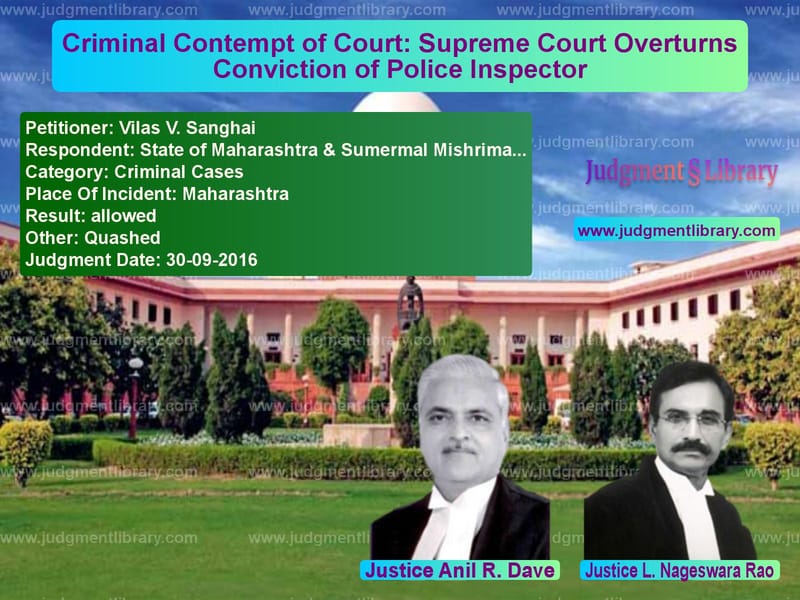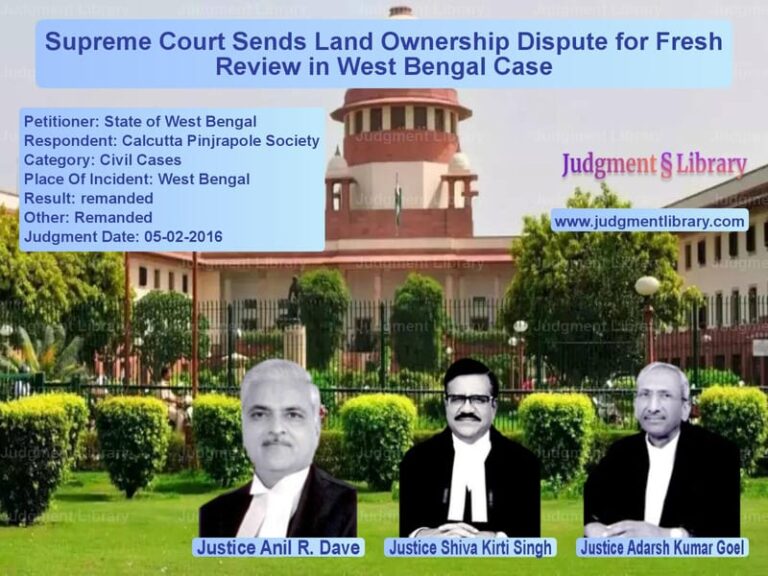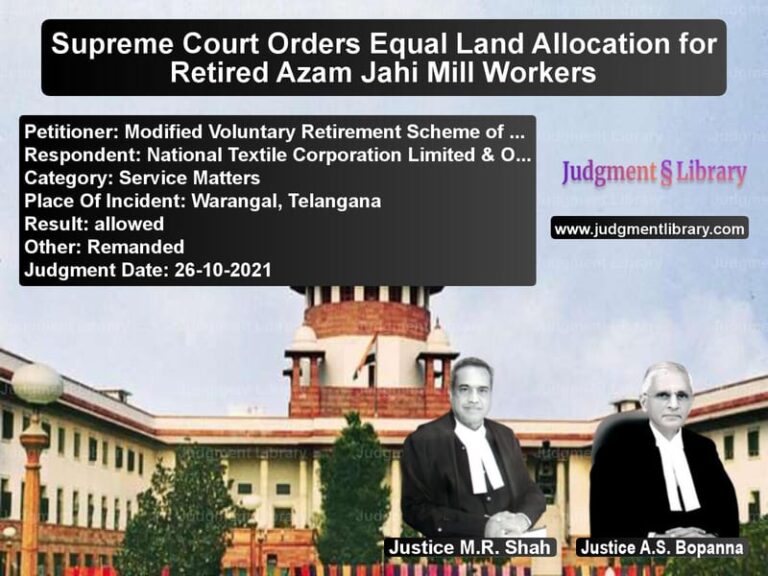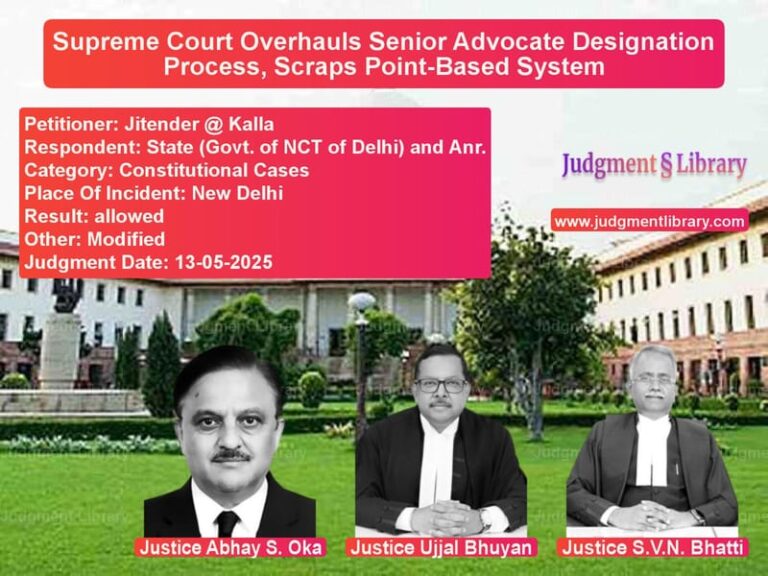Criminal Contempt of Court: Supreme Court Overturns Conviction of Police Inspector
The case of Vilas V. Sanghai v. State of Maharashtra & Anr. revolves around a critical legal issue regarding
criminal contempt of court. The Supreme Court was called upon to decide whether the conviction of a police inspector for
allegedly violating an assurance given during an anticipatory bail hearing was legally justified. The Court ultimately ruled
in favor of the appellant, holding that the contempt proceedings were improperly initiated and that procedural safeguards
must be strictly adhered to in contempt cases.
Background of the Case
The matter originated when Vilas V. Sanghai, a police inspector in Maharashtra, was assigned to investigate a fraud case
against Sumermal Mishrimal Bafna, a trustee of Bafna Charitable Trust. The allegations against Bafna involved offenses under
Sections 420 (cheating), 120-B (criminal conspiracy), and 109 (abetment) of the Indian Penal Code (IPC).
Apprehending arrest, Bafna moved an application for anticipatory bail before the High Court. During the hearing, the public
prosecutor, acting on instructions from Inspector Sanghai, assured the court that Bafna would not be arrested until his bail
application was decided. Despite this assurance, Bafna was taken into custody on September 21, 1993, just one day before the
scheduled bail hearing.
Arguments of the Petitioner
The petitioner, Vilas V. Sanghai, raised the following defenses:
- The assurance given in court was not absolute but was contingent upon Bafna’s cooperation with the investigation.
- Bafna refused to cooperate and obstructed the investigation, necessitating his arrest.
- The contempt proceedings were not initiated in compliance with Section 15 of the Contempt of Courts Act, making them
procedurally defective.
Arguments of the Respondent
The respondent, Bafna, and the State of Maharashtra countered with the following claims:
- The assurance given by the public prosecutor on behalf of Sanghai was unconditional and binding.
- The arrest of Bafna a day before the bail hearing violated the trust placed by the court in the prosecution.
- The act of arresting and handcuffing Bafna and subsequently publishing his photograph in a newspaper amounted to gross
misconduct and contempt of court.
High Court’s Ruling
The Bombay High Court, holding Sanghai guilty of contempt of court, imposed the following penalties:
- Seven days of simple imprisonment.
- A fine of Rs. 2,000.
Supreme Court’s Observations and Judgment
A bench comprising Justices Anil R. Dave and L. Nageswara Rao overturned the High Court’s decision, ruling that
the contempt proceedings were not initiated in accordance with the legal requirements of Section 15 of the Contempt of Courts
Act, 1971.
Key Observations
- Section 15 of the Contempt of Courts Act mandates that contempt proceedings must be initiated by the Advocate General or
by the subordinate court itself. - The contempt action in this case was initiated solely based on Bafna’s complaint, without the approval of the Advocate
General. - The assurance given in court, while significant, was not legally enforceable as an undertaking in contempt proceedings.
Excerpts from the Judgment
The Supreme Court held:
“The criminal contempt proceedings were not initiated in accordance with Section 15 of the Contempt of Courts Act,
rendering them legally unsustainable.”
The Court further observed:
“While the assurance given in court should have been honored, the legal process for initiating contempt proceedings
must be followed strictly.”
Legal Implications
This judgment highlights several critical legal principles:
- Contempt proceedings must strictly adhere to statutory procedures under the Contempt of Courts Act.
- The court must balance enforcement of judicial assurances with procedural fairness.
- Police officers and prosecutors must exercise extreme caution when making commitments before the court.
Impact of the Judgment
The ruling has several significant implications:
- It sets a precedent for handling contempt allegations against public officials.
- It ensures that procedural safeguards are followed in contempt cases.
- It reinforces accountability for law enforcement officers in their interactions with the judiciary.
Comparison with Previous Rulings
In previous cases such as Delhi Judicial Service Association v. State of Gujarat, the Supreme Court had held that
willful defiance of a court’s order amounts to contempt. However, in the present case, the Court distinguished between an
express order of the court and an assurance given during an anticipatory bail hearing.
Conclusion
The Supreme Court’s decision in Vilas V. Sanghai v. State of Maharashtra & Anr. underscores the importance
of procedural compliance in contempt proceedings. While judicial assurances must be respected, procedural lapses cannot be
overlooked in the name of enforcement.
Don’t miss out on the full details! Download the complete judgment in PDF format below and gain valuable insights instantly!
Download Judgment: Vilas V. Sanghai vs State of Maharashtra Supreme Court of India Judgment Dated 30-09-2016-1741883895714.pdf
Direct Downlaod Judgment: Direct downlaod this Judgment
See all petitions in Custodial Deaths and Police Misconduct
See all petitions in Bail and Anticipatory Bail
See all petitions in Judgment by Anil R. Dave
See all petitions in Judgment by L. Nageswara Rao
See all petitions in allowed
See all petitions in Quashed
See all petitions in supreme court of India judgments September 2016
See all petitions in 2016 judgments
See all posts in Criminal Cases Category
See all allowed petitions in Criminal Cases Category
See all Dismissed petitions in Criminal Cases Category
See all partially allowed petitions in Criminal Cases Category







